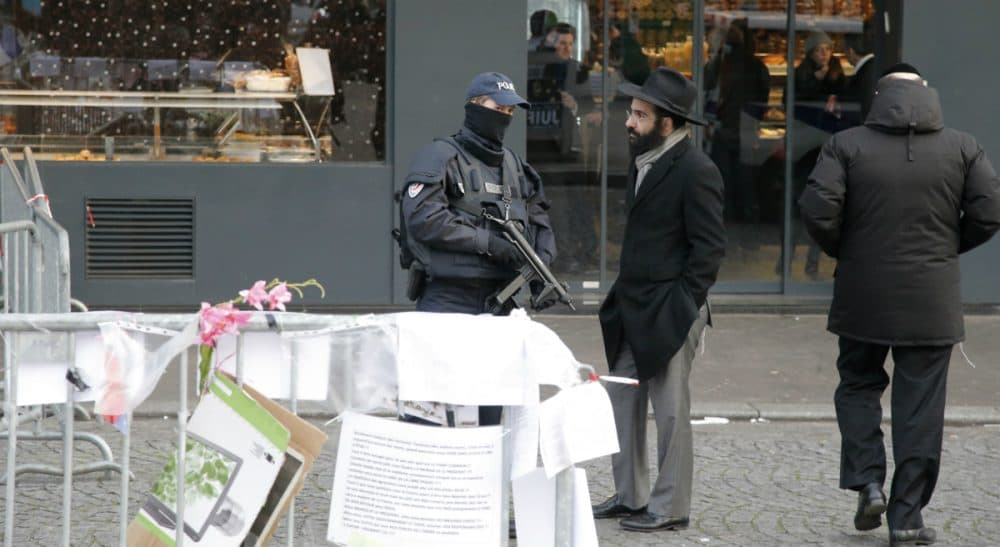Advertisement
Anti-Semitism? There’s More To The Story Of Jews Leaving France For Israel

**A note from the editors: Today, Cognoscenti offers two angles on the relationship between France and Israel: This one, by Sharon Bially, considers the pull that the Holy Land exerts on French Jews, in good times and in bad. The other, by William F. S. Miles, asks whether, given a surge in numbers of French émigrés in Israel, the French language could reprise its historic role in the Holy Land. We hope you will enjoy both offerings.
In the wake of the hostage crisis that turned deadly at a kosher supermarket in Paris earlier this month, there has been a chorus of voices insisting that anti-Semitic violence in France is driving Jews to Israel.
While anti-Semitic violence is, no doubt, cause for anger, anxiety and fear, it underscores, most of all, a feeling that France is not quite home.
Yes, there is a correlation between anti-Semitic acts, ranging from graffiti and physical attacks to targeted arson and homicide, and departures of Jews from France. In the first seven months of 2014 alone, 600 acts or expressions of violence against Jews were reported, compared with a reported 423 such incidents in 2013. In 2014, 6,900 French Jews left France for Israel, up from 3,300 in 2013.
These figures suggest an exodus in direct response to violence, but that’s an oversimplification. As a Jewish American who lived in France for 12 years with my French, Jewish husband, I see a picture of France and its Jews that is far more nuanced.
France’s fraught history with Jews is undeniable. The massive, devastating deportations of Jews to Nazi concentration camps during the Second World War put France on the wrong side of history. But much has changed since then, and it must be taken into account when considering the current state of affairs for Jews in France. It’s wrong to conflate France’s past with the complexities of the present.
In one major shift, France’s Jewish population, which was largely of Eastern European, Ashkenazi descent prior to World War II, is now overwhelmingly of North African origin. More than three-quarters of the half-million Jews living in France today are immigrants or the children of immigrants from the former French colonies Morocco, Tunisia and Algeria. They began leaving those countries in the 1950s, when the founding of the state of Israel sparked tensions with the Muslims they’d lived alongside peacefully for centuries.
When Algeria’s Jews were stripped of Algerian citizenship following that nation’s independence in 1962, they were driven into exile. Masses of Moroccan and Tunisian Jews also fled when the Six-Day War in 1967 further inflamed hostilities and discrimination against them. By the end of that year, nearly a quarter of a million North African Jews had relocated to France.
Just as memories of the Holocaust haunt survivors and their descendants, so the legacy of the persecution that drove North African Jews from their homes remains painful and raw. “We are Jews living in France,” I heard time and again in conversation in France. “We are not French men and women who happen to be Jewish.”
In fact, the first of the Moroccan and Tunisian Jews who left their homes resettled not in France, but Israel. Today, more than 800,000 Jews of Moroccan descent account for 13 percent of Israel’s population.
Two things happened to stem the tide of Moroccan Jews to Israel. In 1951, Israel enacted a Selective Immigration Policy, which restricted immigrants’ eligibility. And in 1956, Morocco banned Jews’ emigration to Israel. Jews seeking to leave North Africa thus turned in great numbers to France, where they spoke the language and were granted the right to live and work. Nevertheless, many Jews in France still have family in Israel, and they visit often.
Even in times of peace, then, Israel represents for many Jews in France the path not taken. While anti-Semitic violence is, no doubt, cause for anger, anxiety and fear, it underscores, most of all, a feeling that France is not quite home.
This is key to understanding the impetus to move to Israel. There is, among French Jews, a powerful sense of connection to the Jewish state that has been passed from one generation to the next.
There is a paradox about French Jews relocating to Israel: There are fewer incidents of anti-Semitic crimes in France than in Israel. In 2013, 105 incidents were recorded, whereas Israel recorded 1,271 such crimes over the same period, not counting war. It takes a deeply-rooted emotional commitment to trade a tragic sideshow of the Middle Eastern conflict for the main event.
...there is yet another key difference for Jews in France today versus those who were there prior to the Second World War: the perpetrators of anti-Semitism.
And there is yet another key difference for Jews in France today versus those who were there prior to the Second World War: the perpetrators of anti-Semitism. Violence and expressions of hatred against French Jews today are largely attributed to marginalized, extremist members of France’s 5-million strong Muslim population. Some are the acts of disaffected, radicalized individuals, as the world witnessed with the attack on the kosher market in Paris. And some are reactions to the ongoing Mideast conflict. Regardless of the impetus, for North African Jews and descendants of those persecuted by their Muslim neighbors, any such violence no doubt triggers painful memories and serves as a worrying harbinger.
Anti-Semitism in France is not the same old beast rearing its head once more. Rather, as the connection between the perpetrators of the tragedy that played out in a kosher supermarket and those behind the massacre at the headquarters of Charlie Hebdo illustrates, the real threat in France, as elsewhere, is terrorism that knows no borders.
